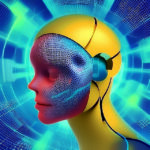
Article Topics.
ToggleArtificial intelligence is...
Artificial Intelligence (AI) is a relatively new scientific discipline that has caused much controversy, innovation, and disruption in many areas of human activity.
Essentially, AI involves the evolution of machines that can supposedly ‘think’ and respond like humans, which would give them the capacity to complete a variety of tasks on their own. This can be incredibly useful in robotics and medical diagnosis, where decisions need to be made quickly and accurately.
Results are achieved by using unique data algorithms to gain intelligence about processes so that it can reach decisions faster and more efficiently than humans. As the technology advances, we believe AI will get smarter, potentially revolutionizing many industries worldwide.
Applications of artificial intelligence - are there benefits?
Many believe that introducing artificial intelligence into our lives has been beneficial, both for convenience reasons and for increased efficiency in industry.
AI can handle a variety of tasks, ranging from everyday chores to performing complex calculations with ease. One of the major advantages of AI is that it reduces human labour as machines learn from their mistakes, enabling them to hone their skills.
This leads to increased productivity, faster production cycles, and a decrease in errors. AI also provides automated services that help make life easier – such as voice simulation and chat bots. These systems can do everything from answering customer inquiries to making recommendations on shopping choices depending on user preferences.
Finally, having access to AI allows us greater insight by analysing banks of data; we can process vast amounts of information with ease and accurately, which helps us make more informed decisions.
AI is being heralded as an invaluable tool that has opened up endless possibilities for society.
Challenges of artificial intelligence.
 We can divide the challenges of artificial intelligence into two specific areas: its technical challenges and potential ethical problems.
We can divide the challenges of artificial intelligence into two specific areas: its technical challenges and potential ethical problems.
In the technical arena, AI systems can often be time-consuming and expensive to develop, and require a significant amount of data to train them to an effective level. Also, many AI systems rely on expert knowledge or domain-specific understanding that is difficult to automate compared to simpler tasks.
Ethically, autonomous decision making and control of resources carries with it the risk of potentially damaging outcomes that are difficult—if not impossible—to predict or prevent.
Last, data bias, privacy concerns and algorithmic accountability are all important considerations when developing an AI system.
Ethical dangers – the primary concern?
 The ethical debate regarding the use of AI continues.
The ethical debate regarding the use of AI continues.
We have to consider the potential for machines to act on our behalf and displace us from positions of influence, even potentially leading to mass job losses in various industries.
The experts must also consider whether we should create AI that can affect human life without considering ethical implications, such as existing regulations and codes of conduct, or even human feelings and values.
If we grant autonomy to robotic machines, they could act in ways difficult to predict or control – another moral dilemma that must be considered a possibility in the future.
Ultimately, AI has immense potential if used responsibly, but risks great harm in the wrong hands.
Future of artificial intelligence.
AI is unlikely to be considered irrelevant.
Its future seems assured whether we agree with its progress or see it as a danger to civilisation. The snow ball is already rolling down the hill, gathering momentum.
Currently, AI is being used in healthcare, finance, and education; but most notably, it is revolutionizing the way we interact with technology. The overall view is that AI is making life easier, which can certainly be the case if you live in one of the industrialised nations of the world.
It’s also beginning to be used in more complex tasks like medical diagnosis and legal analysis. As these areas become increasingly relevant because of their significant implications for society, so too does the demand for the most advanced AI techniques.
Research in this area will continue to grow as scientists strive for more efficient ways of using machine learning techniques and focused learning algorithms on huge data sets.
Ultimately, this could lead to a world where machines can augment our intellect rather than replace it. That, at least, is the optimistic view.
Author: Carel Kolchinski

